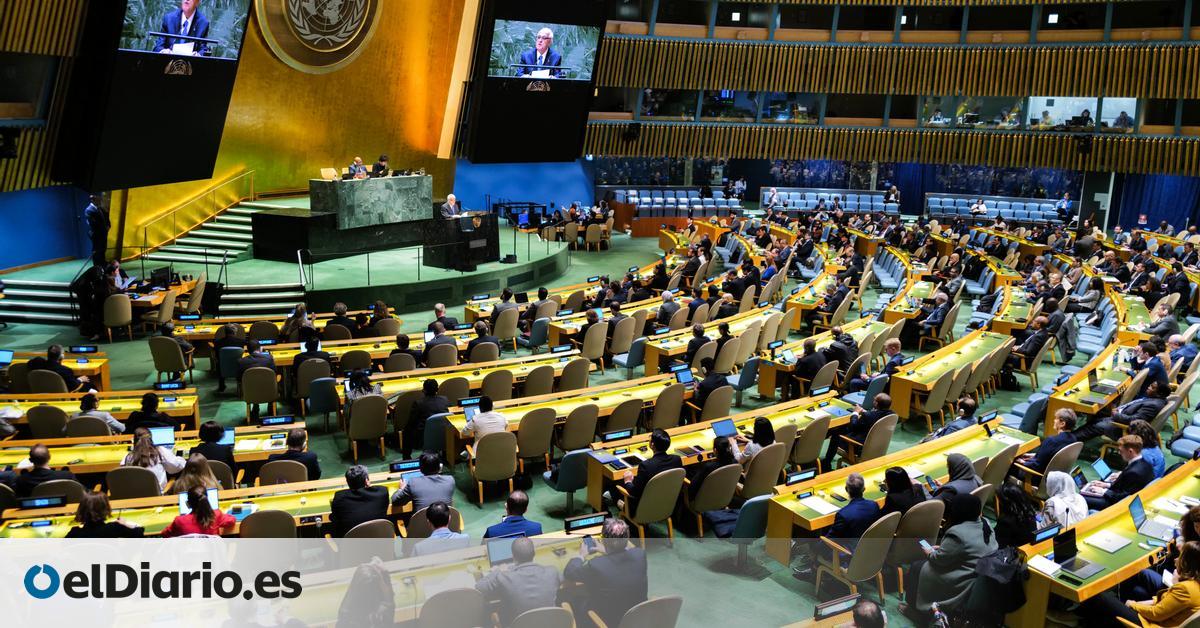
The UN General Assembly this Friday supported Palestine’s attempt to become a full member state of the United Nations, recognizing that it meets the requirements for admission and returning the request to the Security Council, in charge of the issue, for to “reconsider the matter favorably” after last April the US alone thwarted the entry of Palestine with its right of veto.
The General Assembly cannot grant Palestine UN membership, as this requires a recommendation from the Security Council, but the vote serves to gauge how many countries support its right to become a full member state. And the support for the resolution has been overwhelming: 143 votes in favor –Spain among them–, 25 abstentions and nine votes against, among them those of the United States, Israel and Argentina, as well as the Czech Republic and Hungary.
In addition to expressing the opinion of the body, the adopted resolution does grant the Palestinians some additional participation rights and privileges that enhance their observer status within the world body starting next September, such as a seat among members in the Assembly, although You will not be granted a vote in it.
Thus, the approval of this document is not only a pressure tool for the Council, but also represents an effective improvement of Palestine’s observer status within the UN – a role it has had since 2012. The text that was voted on this Friday includes an annex with significant changes, expected from the start of the new session on September 10, including the right to present and introduce proposals and amendments, including on behalf of a group; and the right to make procedural motions, such as raising agenda items and requesting that a proposal be put to a vote, including the right to challenge the chair’s decision.
However, Palestine will still not have the right to vote in the General Assembly or to present its candidacy for UN bodies such as the Security Council or the Economic and Social Council (ECOSOC).
The Israeli ambassador takes out a crusher
Minutes before proceeding to the vote, Riyad Mansour, the permanent observer of Palestine, had asked all members of the Assembly to decide “to be on the side of peace”, which “demands the recognition of our rights”. “They can remain on the sidelines of history, or worse, hinder the path forward,” Mansour said from the lectern. The Palestinian representative has also stated that Israel and “its conspirators” (in a clear reference to the United States) “continue, 76 years after the Nakba, trying to finish the job.” “Israel’s war is a war against the people of Palestine,” he stated.
Next, continuing with the incendiary speech that he has already used in other sessions, Israel’s ambassador to the UN, Gilad Erdan, has accused the Assembly of “promoting the establishment of a Palestinian terrorist state led by the Hitler of the 21st century.” . Erdan’s argument for opposing the vote on the resolution has consisted of ensuring that “privileges and rights will be granted to the future terrorist state of Hamas” and that the doors of the UN will be opened for “contemporary Nazis” and “genocidal jihadists.” .
While speaking at the General Assembly podium, Erdan held up the photo of Hamas military leader Yahya Sinwar with the word “president.” Then, in protest against a future admission of Palestine, he took out a mini-shredder with which he destroyed pages of a copy of the United Nations Charter, saying, angrily: “You are destroying the United Nations Charter with your own hands”. “What a shame,” he concluded.
This Friday’s vote follows the one held last month in the Security Council, in which the draft presented by Algeria for the admission of Palestine obtained the support of 12 members out of 15. Only two abstained, the United Kingdom and Swiss. But Washington’s veto nullified the broad support that the text had received.
With the resolution voted this Friday, the entire question of Palestine’s status will now return to the Security Council, where any attempt to achieve full membership will most likely once again be blocked by the United States. In the ordinary process to admit a new member state to the UN, the recommendation of the Security Council must first be obtained and then voted on in the General Assembly. Specifically, it is necessary for it to obtain the support of two thirds.
This Friday, Robert Wood, the United States deputy ambassador to the UN, justified his vote against the text by ensuring that “this General Assembly resolution is no exception.” Woods has defended that his country seeks “peace in the region” but that it “can only” be achieved through the two-state solution. “Our vote does not reflect our opposition to Palestinian statehood, we have made it very clear that we are in favor of it and that we intend to promote it in a meaningful way. What we do is recognize that statehood will only come about through a process that involves direct negotiations between the parties,” Woods said, relying on the same argument that he already used to veto the admission of Palestine in the Security Council vote.
“There is no other way,” he insisted, after which he warned that if the Council receives a membership application similar to the one in April, “it will probably reach the same situation.” That is, the proposal will end up being vetoed. Just as the American representative was saying these words, the Assembly chamber focused on the Israeli ambassador, who had gotten up from his seat and was collecting his belongings.
Given the worsening humanitarian situation in Gaza, with Israel surrounding more than a million Palestinians who take refuge in Rafah, in the extreme south of the Palestinian enclave, and threatening an invasion of this territory, the Assembly has resumed the tenth session special emergency response (ESS) on the crisis in the Palestinian territory to put the resolution to a vote and put pressure on the Council.
At the beginning of the session, the president, the president of the body, Dennis Francis, recalled that “peace for all” is the purpose of the UN. “I urge the parties in this conflict immediately, and with the support of those who can influence it, to do the impossible, to reach an agreement that allows for a ceasefire to be established that puts an end to this suffering and puts an end to this bleeding. and release all the hostages,” Francis said, not only referring to Israel, but also to the United States, which has always acted in favor of its partner. Since the conflict began, Washington has not only frustrated the admission of Palestine as a full member in the Council, but has also vetoed the request for a ceasefire up to three times – until it abstained at the end of March. .
“The United States is resigned to having another bad day at the UN,” Richard Gowan, a United Nations expert at the International Crisis Group, told New York Times, after the adoption of the resolution this Friday.
The last time a session was held within the framework of the special emergency session was on December 12, 2023, also due to a worsening of the situation in Gaza after the start of the Israeli offensive on October 7 following the attacks of Hamas. At that meeting, the Assembly demanded an immediate humanitarian ceasefire, as well as the immediate release of Israeli hostages captured by the Palestinian militia.
Source: www.eldiario.es

